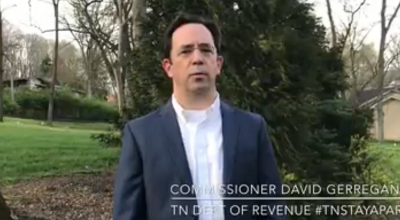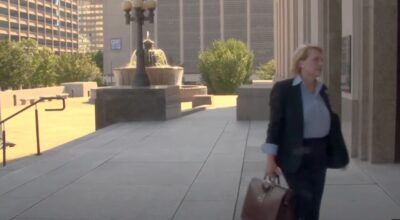Motion for mandatory judicial notice
State of Tennessee on relation respectfully asks the court to take mandatory judicial notice of the law controlling this case. Tenn. R. Evid. 202.
The jointly run program imposing continuing irreparable harm against thousands of Tennesseans must be halted forthwith in the public interest. Misconduct by respondent Gerregano (“Mr. Gerregano,” “revenue” or “DOR”) and respondent Long (“Mr. Long” or “safety”) is premised by a misreading of T.C.A. § 55-12-139, said to universalize the proof of financial responsibility (“POFR” or “FR”) requirement on all vehicle registrants, and by DOR’s no-filter use of the electronic insurance verification system (“EIVS”).
[This filing is a late entry in my case to overthrow “Eye of Sauron” run by department of revenue revoking registration tags of the poor who don’t buy auto insurance.]
Rules of statutory construction control the scope of § 55-12-139 and § 55-12-210, the canons of reading law in pari materia on making the entirety of the law self-interpret and the rule ejusdem generis requiring a general statement in a statute to be constrained in its scope pursuant to surrounding provisions. Relator asks judicial notice of the law in view:
- The law cares about an extraordinary regulated product, the “motor vehicle liability policy,” defined at § 55-12-102(7), contents described at § 55-12-120 and -122 (emphasis added). Industry terminology is the SR-22 certificate.
- A motor vehicle liability policy is certified per § 55-12-102, -119, -120, -121, -123, -125, -126, -133, -136, -137, -139, -210 and -212.
- At scene of a crash or traffic stop, the officer may ask and note insurance information. “If a person has a certificate of compliance with the Tennessee Financial Responsibility Law of 1977, compiled in chapter 12 of this title, issued by the commissioner of safety, a copy of the certificate shall be included in the report.” § 55-10-108 (emphasis added)
- Officer enters ID of SR-22 holder into EIVS to verify if certificate current.
- The certificate verifies proof of future security. If the certificate is no longer valid, the person may be charged with failure to show POFR. Holder can regain license on remission of fees and “submitting evidence of [FR] as required.” § 55-12-115
- Parties on suspended privilege “maintain that proof for the period of the revocation or suspension,” in the form of “the financial responsibility certificate.” § 55-12-126 (emphasis added)
- Insurance is voluntary except for those suspended from privilege. IICMVA rules control how the state manages data and motor vehicle liability certificates.
- EIVS is a utility administering TFRL. It’s not a reform. “Nothing in this part shall alter the existing [FR] requirements of this chapter.” § 55-12-214
- Atwood does not create an independent parallel program to TFRL, run by safety with two triggers: (a) qualifying accident § 55-12-104, -105, or (b) safety response to court judgment, § 55-12-114, or violation of TFRL after qualifying accident.
- Likewise, 2002 amendment by § 55-12-139 does not convert law’s financial responsibility intent into one for mandatory insurance.
- Regulated, licensed insurers under TFRL are part of the Tennessee Automobile Insurance Plan. § 55-12-136
- Regular insurance industry products advertised/sold in Tennessee are not subject of TFRL or Atwood. Subject of this law is the motor vehicle liability policy.
- The motor vehicle liability policy is a non-cancellable, bullet-proof product unlike others. § 55-12-102. Insurers in “[apportioned]” system are required to sell it (“applicants *** entitled”), § 55-12-136(d)(1)(A), and pay on an accident even if it costs millions. Insurer sues insured for clawback. § 55-12-122(f) and (g)
- Insured’s premium keeps motor vehicle liability policy active. Cancellation or termination requires the carrier to notify safety. § 55-12-123
- Seller of motor vehicle liability policy is the “insurer of record.” A POFR-liable person is “eligible for notice” if certified policy lapses. § 55-12-210(g)
- The “motor vehicle liability policy” is “certified” as POFR. § 55-12-102. Respondents force relator to show POFR, claiming ordinary owner’s policy is sufficient as “proof” or “evidence” of POFR, though without certificate.
- Respondents revoke or criminally prosecute citizens over non-certified policies.
- Revenue hearing officer has no subject matter jurisdiction to hear a TFRL petition, forcing the public into a void, futile venue, violating due process.
- TFRL hearings are in safety. § 55-12-103. Tax law defers to TFRL (“In the absence of any other provisions, and except as may otherwise be provided by law”) § 67-1-105(a)(1). It is “unlawful” for Mr. Gerregano to restore a tag without Mr. Long’s written permission. § 55-12-103
State on relation requires an order commanding cessation of all respondent activities in violation of well-established T.C.A. § 55-12-139 and T.C.A. § 55-12-210.

